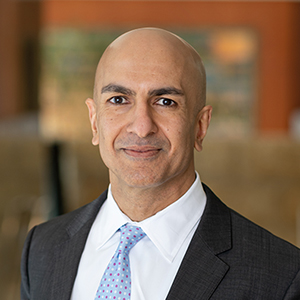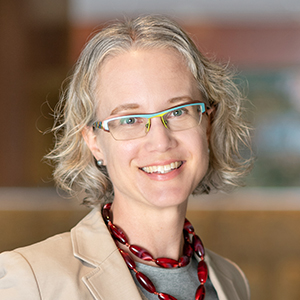William “Bill” Spriggs, chief economist at the AFL-CIO and advisory board member for the Opportunity & Inclusive Growth Institute, passed away at age 68.
Bill was a friend to many at the Minneapolis Fed. President Neel Kashkari and Institute Director Abigail Wozniak share their memories and describe the impact Bill had on the economics profession.
Neel Kashkari, President and CEO—
All of us at the Minneapolis Fed are deeply saddened by the passing of Bill Spriggs. Bill was not only a brilliant economist and tireless advocate for working people, he was also a mentor and friend to me and to numerous others at the Minneapolis Fed. Bill was always gracious with his time and insights, helping to shape our thinking on labor markets, economic opportunity, racial wealth gaps, and many other key issues. Never one to hold back, Bill told us when he thought we were going in the wrong direction, and those debates were always robust but respectful.
Bill served as a member of our Opportunity & Inclusive Growth Institute’s Advisory Board since its inception in 2017. He participated in numerous academic conferences here at the Minneapolis Fed, making important contributions to our thinking about topics ranging from how we set monetary policy to diversifying the economics profession. Following George Floyd’s murder, we were honored to publish an open letter Bill wrote exposing racism in the economics profession.
Bill will be deeply missed by me, my colleagues at the Minneapolis Fed and all others he touched throughout his career.
Abigail Wozniak, Director, Opportunity & Inclusive Growth Institute—
Today the economics and policymaking community learned that Dr. Bill Spriggs passed away in the night. There will be many tributes to Bill and his influence. This is mine.
This is a personal statement, but it reflects the last four years of my work with Bill in his role as an inaugural Advisory Board member to the Opportunity & Inclusive Growth Institute, which is how I came to know Bill personally.
There is so much to say, but let me start with the anger. I feel a lot of anger that he wasn’t better recognized by our economics profession before he passed. He deserved to enjoy some of the accolades our profession reserves for its most senior leaders. Some of this anger is directed at myself. I had begun thinking about how the Institute could recognize Bill’s significant and sustained contributions—to the Minneapolis Fed, to the Institute, and to the economics and policymaking professions—as part of the Institute’s research conference this fall. I had also planned to nominate him for the biennial Lazear Prize recognizing a labor economist who combines excellence in research with outstanding public service, which is next open in 2024. I knew he was in poor health, and I worried these timelines were not fast enough. They were not, and I wish I had done more sooner.
I am also angry that we are succumbing to convenient amnesia about the lessons he forcefully imparted in 2020 and before. Fortunately, unlike the recognition, we still have an opportunity to correct this. I discuss this more below.
Before that, let me turn to the sadness. I’ve only recently understood how much some mentors become like parents to those of us who join an intellectual community. They teach you to see the world in a way that you will always carry with you. They shape some of the biggest decisions you make. Bill became one of those people for me. Right now I feel sharp sadness imagining our world—in economics research and in research-informed economics policy discussions—without him.
Finally—because I have to stop somewhere so you can read other, better tributes—let me explain what I learned from Bill and how he infused the Institute with his experiences and his thinking. My first memorable experience with Bill was in early 2019 when he declined to appear at an Institute conference because it fell on his adult son’s birthday. I will admit, my first reaction was “But … but …” I quickly came over to, “Of course. How many birthdays does a father get with his son? Take all of them.” Bill’s example encouraged me to work to set a tone at the Institute that supported the same kinds of decisions by our staff and everyone we interact with. (Because he was unfailingly generous with his time, Bill participated the following day.)
Then, in 2020, in the week after George Floyd’s murder, I reached out to Black scholars affiliated with the Institute and offered to support sharing their perspectives on how economics or the Fed should absorb this event. Bill responded with his statement, “A teachable moment? Will George Floyd’s death spur change in economics?” He encouraged us to think about how the way we approach questions of racial inequities almost always overlooks important facts of history and group behavior. This limited view alienates people who might otherwise contribute to our profession. It also means we miss opportunities to contribute to more thorough and lasting solutions. Bill’s passion was clear, and I was amazed at what he crafted in such short order. But then I remembered, “Of course. He’s been thinking about this his whole life.”
Still, I was skeptical that many would be interested in what this meant for economics given the international heartache at the time. I was wrong. Bill’s hypothesis—that it’s not just who is in economics that limits our contributions to racial equality but also how we do our work—attracted many readers and became the basis of his conversation at our 2021 event with Mary Daly and Sendhil Mullainathan. It attracted readers for whom it was likely the first of Bill’s work that they’d read. In spite of this wide audience, the lessons in his letter are ones that I worry we are allowing to fade, as I noted above.
In his role as a lifelong scholar of the labor market and its institutions, Bill brought even more to the Institute and the Minneapolis Fed. On many occasions, he posed thoughtful questions about our view of the labor market. Not everyone agreed with him. But always at the heart of his questions was his insistence that we didn’t have to accept human collateral damage on the way to economic growth.
Bill last visited the Institute in November 2022, despite the fact that he was experiencing lingering poor health. In the months since, affiliated scholars and staff economists have many times mentioned to me the comments he made at the event. They generated ongoing discussion about how our scholarly community should best confront his concerns. Again, not everyone agreed. But everyone listened and considered the question at hand from a new perspective. His contributions that day will continue to shape how we foster intellectual exchange here at the Institute.
My heart breaks for his family and for others who knew him better. Now it’s time for the rest of us to shoulder more of his mission and carry it forward.







